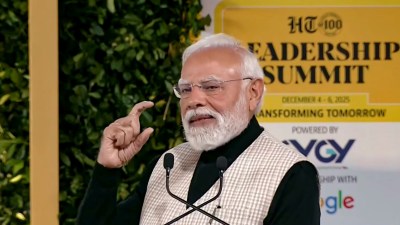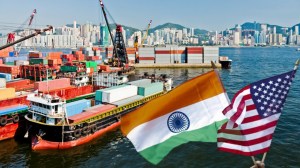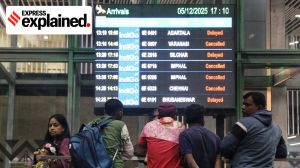India has high stakes in the West Asian region, and the Ministry of External Affairs has said “It is important that the conflict doesn’t take a wider regional dimension and we urge that all issues be addressed through dialogue and diplomacy.”
Could India play a role in the crisis that goes beyond its appeal for “restraint” by “all concerned”?
Modi met Abbas on the sidelines of the UN General Assembly on September 23, expressed “deep concern” at the humanitarian situation in Gaza, and reaffirmed India’s support for the early restoration of peace and stability in the region.
In October last year, Modi had spoken to Abbas to convey condolences at the civilian deaths at Gaza’s al-Ahli Hospital, and reiterated India’s “long-standing principled position on the Israel-Palestine issue”.
On September 30, the Prime Minister spoke to his Israeli counterpart to underline that “terrorism has no place in our world”. The priorities were to “prevent regional escalation”, the “safe release of all hostages”, and “early restoration of peace and stability”, Modi told Netanyahu.
Story continues below this ad
But to play any meaningful role as a possible mediator, India will need, apart from communication channels with both sides, significant leverage with them as well.
 Smoke rises from the site of an Israeli airstrike in Dahiyeh, Beirut, Lebanon, Wednesday. (Photo: AP/PTI)
Smoke rises from the site of an Israeli airstrike in Dahiyeh, Beirut, Lebanon, Wednesday. (Photo: AP/PTI)
Relationship tightrope
Six months ago, Iran had launched a swarm of drones, ballistic missiles, and cruise missiles at Israel in response to a suspected Israeli strike on an Iranian consular building in Damascus in which a senior Iranian general was killed.
The wave of aerial attacks on Israel this week was in line with the Iranian response seen both in April and in January 2020, when it responded to the assassination of Quds Force chief Qasem Soleimani by firing ballistic missiles at a US military base in western Iraq.
Neither of Iran’s two attacks on Israel caused much damage, probably by design. Israel responded to the April attack with a limited strike near Isfahan a week later. But a stronger response this time could tip the region into full-blown war.
Story continues below this ad
This is a major worry for India, which has strategic ties with both Israel and Iran.
The strategic relationship with Israel, especially the defence and security partnership, has grown and deepened under the Narendra Modi government. The two sides have strong shared concerns over extremism and terrorism. Israel has emerged as a major defence supplier alongside the US, France, and Russia — and New Delhi remembers that the Israelis had stepped up at its time of crisis during the Kargil war in 1999.
Iran, on the other hand, has been a major supplier of crude to India. Also, the two countries share concerns on terrorism emanating from Pakistan and Afghanistan, and on the Taliban’s treatment of minorities and lack of an inclusive and representative government in Kabul. The Chabahar port is a project of great strategic and economic importance to India.
Past tensions between Israel and Iran — after, for example, the attack on an Israeli diplomat’s wife, allegedly at Iran’s behest, in Delhi in February 2012, and verbal jousting between the ambassadors of the two countries to India — have brought discomfiture to New Delhi. Widening of the conflict in the Middle East will make it difficult for India to stay ambivalent.
Story continues below this ad
India’s own stakes
An escalation of tensions could impact India with regard to its people living in the region, its economic interests, and its strategic needs.
* There are about 18,000 Indians in Israel, about 5,000-10,000 in Iran, and some 90 lakh in the region as a whole. A wider conflict will put this huge Indian community at risk.
* The West Asian region provides India with 80% of its oil supplies. A wider war will almost inevitably raise energy prices. Also, major Arab countries have been keen to invest in the Indian economy; those plans will likely be disrupted in the event of a wider conflict.
* India has invested in its relationships with major Arab countries, Iran, and Israel. New Delhi sees the region as its extended neighbourhood, and has been working with all sides to push for the India-Middle East-Europe Economic corridor, which promises both strategic and economic benefits. It is keen to see that the consensus around peace is not unravelled by war.
Other players in the region
Qatar: Hugely influential
Story continues below this ad
Qatar has been a consummate navigator of regional faultlines. It has engaged with all sides, given billions of dollars as aid to Palestine, hosted the leaders of Hamas, and pumped money into Gaza. Both the US and Israel have depended on Qatar for mediation efforts. Al Jazeera, which is part funded by the Qatari government, wields tremendous influence in the Arab world.
Egypt: Israel’s neighbour
Egypt borders both Gaza and Israel. It lost the Sinai Peninsula to Israel in the 1967 war, but recovered it in 1982 after the 1979 peace treaty. When President Mohamed Morsi was in office (2012-13), there was apprehension that Cairo might be colluding with Hamas, but under President Abdel Fattah al-Sisi, it has focused strongly on countering terrorism and Islamist movements. Worried about a refugee influx from Gaza, Egypt has put forth ceasefire initiatives.
Saudi Arabia: Peace stake
Saudi Arabia views itself as the leader of the Islamic world and, under Prince Mohammed bin Salman, has been trying to advance connectivity initiatives in the region. However, Riyadh’s relationship with Shia Iran has a complicated history. Progress on the Saudi-Israel peace talks have been frozen for now.
UAE: With eye on its future
The UAE, too, is keen to see stability and peace in the region in order to build on its own prosperity and to future-proof itself. Under its ruler Mohammad bin Zayed, it wants to drive the IMEEC initiative. The UAE signed a normalisation agreement with Israel in 2020.
Turkey: Key back channel
Story continues below this ad
President Recep Tayyip Erdogan has criticised Prime Minister Benjamin Netanyahu; yet, after Iran’s April 13 attack on Israel, Turkey was among the key back channels between Tehran and Israel’s western allies. Turkish officials are among the few who speak directly to the US, Israel, Hamas members, and Iran.
US: Traditional arbiter
The US has been the traditional international mediator in the region, and its envoy Amos Hochstein has been trying to prevent escalation. “We continue to believe that a diplomatic resolution is achievable,” he has said. However, there is no trust between the US and Iran, and Washington is squarely on Israel’s side.
China: Positioning itself
As Washington’s influence and credibility wanes, Beijing has tried to cast itself as a possible mediator and peacemaker. China’s attempts to forge a Saudi-Iran deal and facilitate Hamas-Fatah talks are driven by its geo-economic and geo-political interests in Iran, Saudi, and UAE. They are also an indicator of its rising global profile.

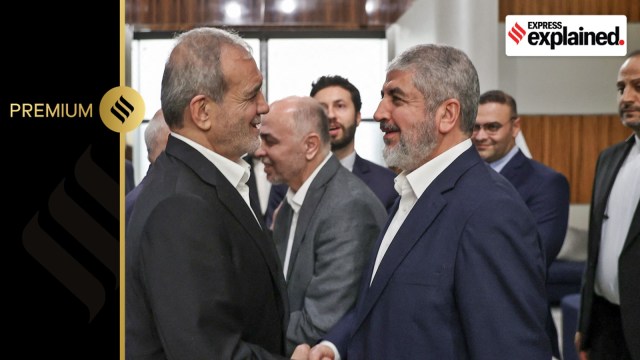

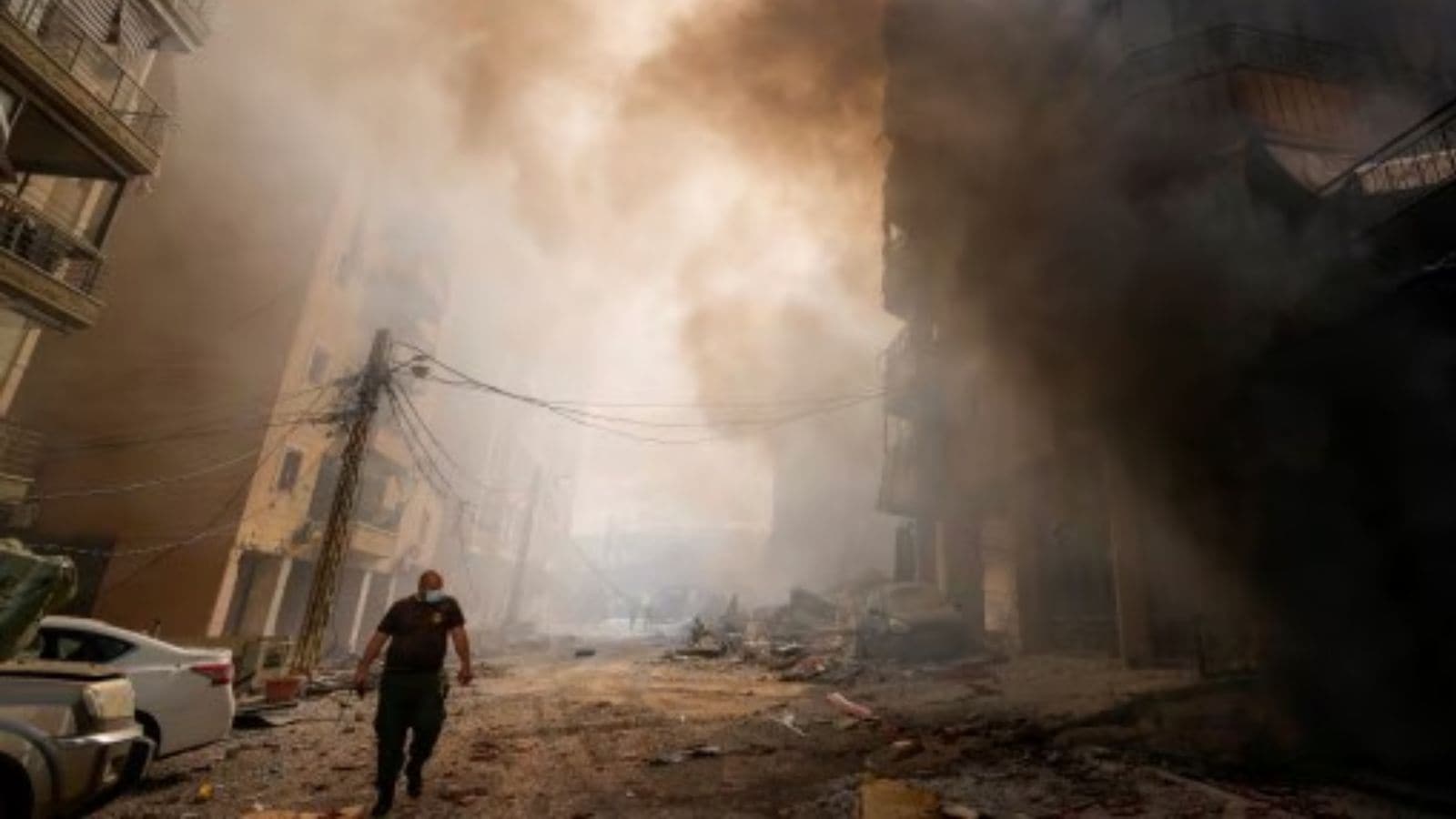 Smoke rises from the site of an Israeli airstrike in Dahiyeh, Beirut, Lebanon, Wednesday. (Photo: AP/PTI)
Smoke rises from the site of an Israeli airstrike in Dahiyeh, Beirut, Lebanon, Wednesday. (Photo: AP/PTI)
